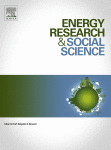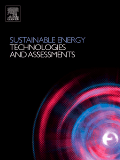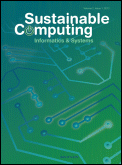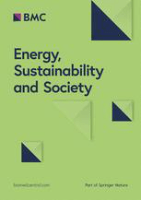
Energy Research & Social Science
Scope & Guideline
Innovating Solutions for Tomorrow's Energy Challenges
Introduction
Aims and Scopes
- Interdisciplinary Research on Energy Justice:
The journal emphasizes interdisciplinary approaches that explore the concept of energy justice, addressing issues of equity, access, and rights related to energy systems. - Socio-Technical Systems Analysis:
It seeks to understand the interactions between social and technical elements in energy transitions, including how policies, technologies, and social practices co-evolve. - Community Engagement and Grassroots Movements:
Research on the role of community initiatives, grassroots movements, and local governance in promoting sustainable energy solutions is a core focus. - Impact Assessment and Policy Analysis:
The journal encourages studies that assess the social, economic, and environmental impacts of energy policies and technologies, aiming to inform better decision-making. - Global Perspectives on Energy Transitions:
It covers energy transition dynamics across different global contexts, particularly in the Global South, highlighting diverse pathways and challenges. - Behavioral Insights into Energy Consumption:
Research exploring consumer behavior, social norms, and cultural factors influencing energy use and adoption of renewable technologies is also a significant area of interest.
Trending and Emerging
- Energy Democracy and Community Empowerment:
There is a growing emphasis on themes related to energy democracy, highlighting the importance of community participation and local governance in energy transitions. - Intersectionality in Energy Research:
Emerging studies are increasingly addressing intersectional issues, exploring how race, gender, and socio-economic status affect energy access and justice. - Resilience and Adaptation Strategies:
Research that focuses on resilience in energy systems, particularly in the context of climate change and social vulnerabilities, is gaining traction. - Digitalization and Smart Energy Technologies:
The integration of digital technologies in energy systems, including smart grids and IoT applications, is a rapidly growing area of interest. - Behavioral and Social Dimensions of Energy Use:
There is an increasing focus on understanding the social and psychological factors that influence energy consumption patterns and technology adoption. - Global South Perspectives:
Research that emphasizes energy transitions in the Global South is trending, reflecting a need for diverse narratives and solutions applicable to different contexts.
Declining or Waning
- Traditional Energy Sources and Technologies:
There appears to be a decreasing emphasis on research related to conventional energy sources like coal and oil, as the focus shifts towards renewable energy and sustainable alternatives. - Narrow Policy Analyses:
Research that solely focuses on isolated policy analyses without considering broader socio-economic contexts is less prevalent, indicating a move towards more integrated approaches. - Static Technological Assessments:
There is a reduction in papers that assess technologies in isolation, without consideration of their social implications or integration within socio-technical systems. - Local Case Studies without Broader Context:
While local case studies remain important, there is a decline in those that do not connect to wider trends or global issues, suggesting a demand for more holistic perspectives. - Overly Technical Approaches:
Research that relies heavily on technical or quantitative models without incorporating qualitative insights or community perspectives is becoming less favored.
Similar Journals

Energy Strategy Reviews
Driving impactful research in the realm of energy studies.Energy Strategy Reviews is a premier journal dedicated to the field of energy studies, published by ELSEVIER in the Netherlands. With an ISSN of 2211-467X and an E-ISSN of 2211-4688, this open-access journal has been fostering significant discourse in energy strategies since its inception. Recognized for its scholarly contributions, Energy Strategy Reviews proudly holds a 2023 ranking of Q1 in the Energy (Miscellaneous) category, reflecting its elite status within the scientific community, highlighted by a Scopus rank of 12 out of 78, placing it in the 85th percentile. The journal serves as a vital platform for researchers, professionals, and students alike, addressing pressing energy issues and innovative solutions. Since 2019, it has embraced an open access model, ensuring that its content is widely accessible. As it continues to converge knowledge from various angles of the energy landscape through 2024 and beyond, Energy Strategy Reviews plays a crucial role in advancing sustainable energy practices and policies globally.

Discover Sustainability
Connecting research with real-world impact.Discover Sustainability is a prominent academic journal published by Springer Nature, dedicated to advancing knowledge in the fields of sustainability, energy, environmental science, and geography. Established in 2020, this Open Access journal aims to provide a platform for high-quality research that addresses pressing global challenges related to sustainable development. With an impressive Q2 ranking in various categories including Energy (miscellaneous), Environmental Science (miscellaneous), Geography, Planning and Development, and a respectable position in Renewable Energy, Sustainability and the Environment, it serves as a vital resource for researchers, professionals, and students alike. As the importance of sustainability initiatives continues to grow, Discover Sustainability offers a valuable repository of innovative ideas and empirical studies that contribute to the advancement of sustainable practices worldwide. Explore this journal to engage with groundbreaking research that shapes the future of our planet.

Progress in Energy
Unlocking the Future of Energy Through Open AccessProgress in Energy, published by IOP Publishing Ltd, is an esteemed open-access journal that focuses on cutting-edge research in the field of energy. With its e-ISSN 2516-1083, this journal stands out for its commitment to disseminating high-quality articles that aim to advance the understanding and application of energy technologies and policies. Juggling respectably in the academic arena, it proudly holds a Q1 classification in the energy (miscellaneous) category and ranks 6th out of 73 in the general energy sector, placing it in the top 92nd percentile among its peers, according to Scopus metrics. The journal's scope encompasses a wide range of topics, including renewable energy, energy efficiency, and policy analysis, making it a vital resource for researchers, industry professionals, and students alike. With a publication horizon extending from 2019 to 2024, Progress in Energy invites contributions that push the boundaries of knowledge in energy fundamentals and innovations.

Sustainable Energy Technologies and Assessments
Contributing to a Sustainable Energy FutureSustainable Energy Technologies and Assessments is a prestigious journal published by ELSEVIER, based in the United Kingdom, focusing on the critical field of energy engineering and its intersection with sustainability. Since its inception in 2013, the journal has established itself as a leading platform for disseminating innovative research and assessments of sustainable energy technologies, earning a notable Q1 ranking in both Energy Engineering and Power Technology, as well as Renewable Energy, Sustainability, and the Environment. With an impressive Scopus ranking—#22 out of 272 in Energy Engineering and #40 out of 270 in Renewable Energy—this journal is essential for researchers and professionals seeking to advance their knowledge on cutting-edge developments and assessments in sustainable energy. Although the journal operates on a subscription basis, it remains committed to promoting high-quality research that aligns with global sustainability objectives. Researchers and students alike will find invaluable insights and data that shape the future of renewable energy technologies within these pages.

International Energy Journal
Fostering Collaboration in Energy ResearchInternational Energy Journal is a pivotal academic publication dedicated to advancing research and knowledge in the dynamic field of energy. Published by the REGIONAL ENERGY RESOURCES INFO CENTER in Thailand, this journal focuses on a broad spectrum of energy topics, including renewable sources, energy policy, and sustainable practices. With a recognized Q3 category ranking in the field of Energy (Miscellaneous) and a Scopus rank of #47 out of 73, it serves as a critical platform for researchers, professionals, and students eager to contribute to and stay abreast of the latest trends and developments in energy science. The journal, which has been in continuous publication since 2000, operates on an open-access basis, ensuring that its findings are accessible to a global audience. Researchers looking to publish their work in a well-respected journal with a growing impact factor will find the International Energy Journal to be an excellent choice for disseminating their studies and innovations in this essential field.

Sustainable Computing-Informatics & Systems
Unleashing the potential of computing for a sustainable future.Sustainable Computing - Informatics & Systems is a prestigious journal published by Elsevier, focusing on the dynamic intersection of sustainable practices within the realms of computing and information systems. With an impressive impact factor and showcasing its significance by ranking in the Q1 quartile in both Computer Science and Electrical and Electronic Engineering categories (2023), this journal serves as a vital resource for researchers, professionals, and students alike. The journal addresses contemporary challenges and innovations related to sustainability through advanced computing technologies, spanning interdisciplinary studies and practical applications aimed at promoting eco-friendliness in the tech industry. With an active commitment to foundational and applied research, it encourages contributions that advance both academic knowledge and real-world sustainable practices. The journal enjoys a global readership and outreach, providing a platform for groundbreaking research that meets the environmental demands of today and tomorrow.

Frontiers in Energy
Exploring the Future of Energy Through Groundbreaking Research.Frontiers in Energy is a distinguished journal published by HIGHER EDUCATION PRESS, focusing on the dynamic and rapidly evolving field of energy engineering and power technology. Established in 2011, the journal serves as a pivotal platform for disseminating innovative research findings and practical applications that address critical challenges in energy systems. With an impressive Q2 ranking in 2023 and a Scopus rank of 81 out of 272 in the discipline, it highlights the journal's influential impact within the academic community, reflecting its commitment to high-quality research. Based in Beijing, China, the journal aims to promote open and accessible scientific discussion, facilitating collaboration among researchers, professionals, and students alike. As an open access publication, Frontiers in Energy ensures that valuable knowledge is readily available to a global audience, effectively contributing to advancements in sustainable energy solutions. Join the forefront of energy innovation by engaging with cutting-edge research that shapes our energy future.

International Journal of Energy and Environmental Engineering
Uniting Expertise for a Sustainable Energy LandscapeInternational Journal of Energy and Environmental Engineering, published by SPRINGER HEIDELBERG, is a leading platform for innovative research in the fields of energy and environmental engineering. With an ISSN of 2008-9163 and an E-ISSN of 2251-6832, this journal is dedicated to advancing knowledge and technology that intersects both energy and environmental disciplines. Recognized in the Q2 category for 2023 in both Energy (miscellaneous) and Environmental Engineering, this interdisciplinary journal aims to address global challenges in energy sustainability and environmental protection. The journal also boasts strong Scopus rankings, standing at Rank #73 in Environmental Science and Rank #28 in General Energy, highlighting its influential role within the academic community. Researchers, professionals, and students are encouraged to contribute and engage with cutting-edge studies that push the boundaries of knowledge and innovation in energy and environmental engineering.

Frontiers in Energy Research
Illuminating the future of energy research.Frontiers in Energy Research is a prestigious open-access journal published by FRONTIERS MEDIA SA, dedicated to advancing knowledge in the diverse fields of energy research. Launched in 2013, the journal has established itself as a pivotal platform for disseminating high-quality research, particularly in areas such as Economics and Econometrics, Energy Engineering and Power Technology, and Renewable Energy, Sustainability and the Environment. With a notable impact factor and impressive quartile rankings, including Q2 in multiple categories and a reputation for rigorous peer review, Frontiers in Energy Research offers researchers, professionals, and students alike a vital resource for exploring the latest innovations and insights in energy studies. Operating from its base in Lausanne, Switzerland, this journal is committed to enhancing open accessibility to relevant research, significantly contributing to the global dialogue on energy solutions and sustainability.

Energy Sustainability and Society
Exploring the nexus of energy, society, and sustainability.Energy Sustainability and Society is a leading open-access journal published by BMC, focusing on the critical intersections of energy sustainability and societal impacts. With an impressive Impact Factor and notable rankings—including Q1 in both Development and Energy Engineering, as well as Q2 in Renewable Energy, Sustainability, and the Environment—this journal serves as a pivotal platform for researchers, professionals, and students exploring innovative solutions to energy challenges. Since its inception in 2011, the journal has consistently provided high-quality research and insights, contributing significantly to the fields of energy policy, renewable technologies, and sustainable development. Access options are fully open-access, ensuring that research is freely available to foster collaboration and knowledge-sharing across disciplines. The journal’s commitment to publishing cutting-edge research underscores its importance in shaping a sustainable energy future.